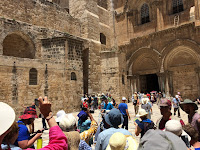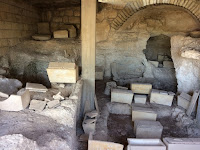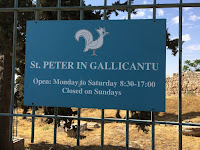Jesus
traveled the Sea of Galilee often, taught in the area, perhaps even had a home for awhile in Capernaum, a town at the northwest edge of the Sea. When I got to
stay a couple of days at a kibbutz there, which now caters to the tourists who
flock to the beautiful sand of the beaches, the blue, blue water of that big scenic
lake, our group rode one of the tourist boats called “The Queen of Sheba.” It
might as well have flashed a neon sign, “TOURISTS! TOURISTS!”
Our
Israeli guide said to us at one point something along the lines of, “You wanted
to walk where Jesus walked. Well, look out here,” and waved her arm at the
water of that picturesque Sea, “there you are.” I saw in my mind Jesus walking
on that water heading to the terrified disciples in their boat, Peter stepping
out, heading to his Friend and Leader, looking down, crying out, and Jesus
taking his hand, the both of them stepping into the boat.
What
I would give to be back in that same spot again, walking that sand, breathing
that air!
Of
course, now modern conveniences like air conditioned cottages and umbrellas
with beach chairs dot the beach landscape. But not far away, ancient ruins also
lie about like reminders of the times before, the times when Jesus’ sandals
marched the nearby roads, the sands of those beaches, calling men from their
fishing boats. “Come, follow me! I’ll give you a new job—to fish
for men!”  One
day as he emerged from a boat after crossing the Sea, the crowds waited. His
reputation had spread, stories of healing in the day when doctors no doubt
tried their best, but the words “medicine” and “modern” meant very different
things than they do today. Even now, if, truly, the touch—merely, and truly,
the touch of a man could heal us from the dread diseases that modern science
cannot fix--we would travel far and drain our resources to reach that one. At
one time in Capernaum, at what may have been His home, four friends cut a hole in the roof to lower a friend to
Jesus, as the crowd would not let them through to reach Him, desperate for the
healing of their friend.
One
day as he emerged from a boat after crossing the Sea, the crowds waited. His
reputation had spread, stories of healing in the day when doctors no doubt
tried their best, but the words “medicine” and “modern” meant very different
things than they do today. Even now, if, truly, the touch—merely, and truly,
the touch of a man could heal us from the dread diseases that modern science
cannot fix--we would travel far and drain our resources to reach that one. At
one time in Capernaum, at what may have been His home, four friends cut a hole in the roof to lower a friend to
Jesus, as the crowd would not let them through to reach Him, desperate for the
healing of their friend.
Sometimes
I tell myself I am too tired even to get in the car to drive the few miles I
live from church. And, yes, I know Jesus does not reside in a building. But, His
people meet there. How often does He speak from those people, from that pastor?
How desperate am I to hear from Him and what have I missed in the not going? As I key these words, in my ears I hear
Michael W. Smith sing those moving words in the worship song, “I’m desperate
for you.” Even so, Lord……
On
that day so long ago, a woman, herself desperate and despairing, placed herself in
the crowd to try to get to Jesus. She had what the Bible calls in some
translations an “issue of blood.” The New American Standard translates it a
“hemorrhage.” However you translate it, she had been bleeding for twelve years.
Twelve. Years. Twelve years. Without stopping.
In
that culture, that meant far more than just the monthly (and for her yearly) inconvenience almost all women of all cultures know. It made her “unclean,” meaning no one—NO one—could touch her AT
ALL. Perhaps she had come from far away (we don’t know) but she so despaired
that even knowing that she made all those in the crowd around her who so
brushed up against her unclean just by her inadvertent movements, still she
came to try to get to Jesus. Could Jesus really heal her? The Bible tells us that already she had
spent all the money she had going from doctor to doctor. Probably they had
tried, truly tried, to help her. We will think the best of them; but they could
not do what they could not do. After twelve years, all their efforts came to
nothing.
Not
only had their efforts taken all her money, but by this time, she likely was
anemic from the constant bleeding. If she had a husband, quite likely he was
gone, unable to touch his wife at all. Maybe not—but, really, how many men in
an age when women frequently were viewed as objects to bargain for and with
rather than as equals would stay with a woman they could in no way touch? If
she had not married, well. Desperate.
Also
present in the crowd that day, a high synagogue official, Jairus by name, came
to Jesus, falling at his feet, also desperate, and begged for his daughter, ill
to the point of dying. “Please come and heal her! She is about to die!” And so
Jesus, ever compassionate, started off with Jairus. Why did Jesus leave the crowd to go with Jairus? That can be explored.... and should be. The Jairus is not our central character here. It is the woman. The desperate, despairing, frantic woman.
Back
in the crowd that woman, so longing for Jesus healing touch, saw them starting
to leave and pushed forward through the men and women there, thinking, “I
don’t need to talk to Him, don’t need Him even to see me. If I can just touch
the hem of His robe, that will be enough! If I can just touch him!”
And
so she did, hardly got close enough to barely brush the hem of His robe, just a
soft…….. bare……. touch…….
And
IMMEDIATELY she was healed!!! And she knew it!!
Then, suddenly
Jesus stopped!
Because
of the way my mind works, I see in my mind the disciples bumping into the back
of him—bump-bump-bump-bumpbumpbumpbumpbumpbump!!! Kind of like the seven dwarfs
into the back of Snow White in the woods for some reason. I have no idea why.
But,
once they sort themselves out, Jesus said, “Who touched me?”
The
disciples looked around at the throng of people closing in on them. The anxious
father, worry for his ill daughter at home, no doubt, just wanted to be on his way. Maybe, maybe he had enough
belief in Jesus to be patient. Either way, Peter spoke up and said, “Who touched
you? Who didn’t?”
But
Jesus waited, and, finally, said, “Someone touched me. Power left me.”
Because
when a woman of faith touches the Living Son of God, they both know it.
I
want to touch Him that way.
The
woman—our formerly bleeding woman, her name never given here, her story told in
three gospels, her boldness passed on to us to give us courage over our hurts
and fears to brave what we must to push our way through the crowds of daily
life, through indifferent, uncaring throngs of circumstance and barricades--turned
and threw herself at His feet, telling Him why she had, in her anguish and
misery, reached out to the only Hope she felt she had left, and immediately
felt His healing touch.
And
He gently responded to her, “Daughter, your faith has made you well; go in
peace.”
Jairus’
daughter also gets healed, and though that story is as dramatic as the woman’s, deserves the telling on its own.
We
do not know any more of this woman’s life after this. I would like to think she
had a man who had waited for her, as miraculous as that would have been—a man
like Joseph who had taken Mary, Jesus' mother, as his wife in such sacrificial circumstances. Well, it could have happened. Or perhaps she married later, had
children. But, maybe not.
Maybe
she didn’t want a man and a family; I may just be projecting all over the place
there. We don’t know of her life after this in Scripture.
At
least we don’t know yet.
But,
someday in Heaven I want to find her. And I will tell her what an impact this
brief day in her life made on me, how I thought of her so often, how her faith
so moved me. I will ask her to tell
me her version—what it felt like
when, after so many years, she felt whole and well again! Did she run home? Did
she again hug her mother—an action denied to her for so long? If her mother was
still alive?
And
I will now try to use that story as inspiration for my own life. I want to
touch the Living Christ with a faith recognized by both of us. I want to be
desperate enough for Him that when I reach for Him, I can brush His robes, and
we will both know it.
Even
so, Lord Jesus.



























